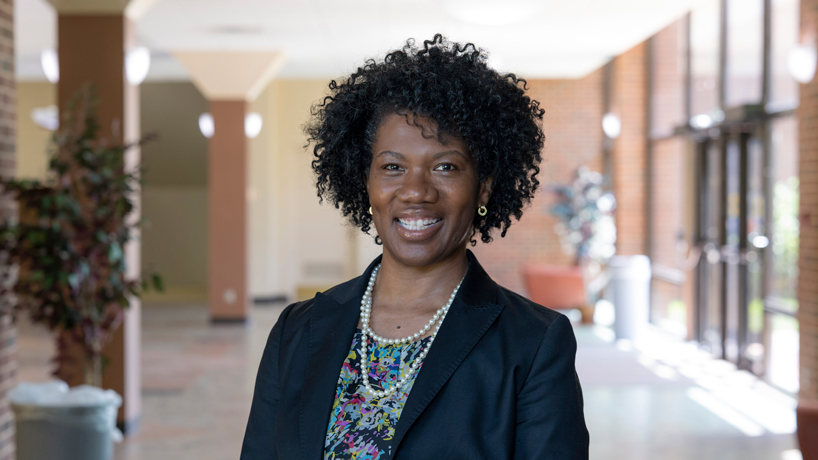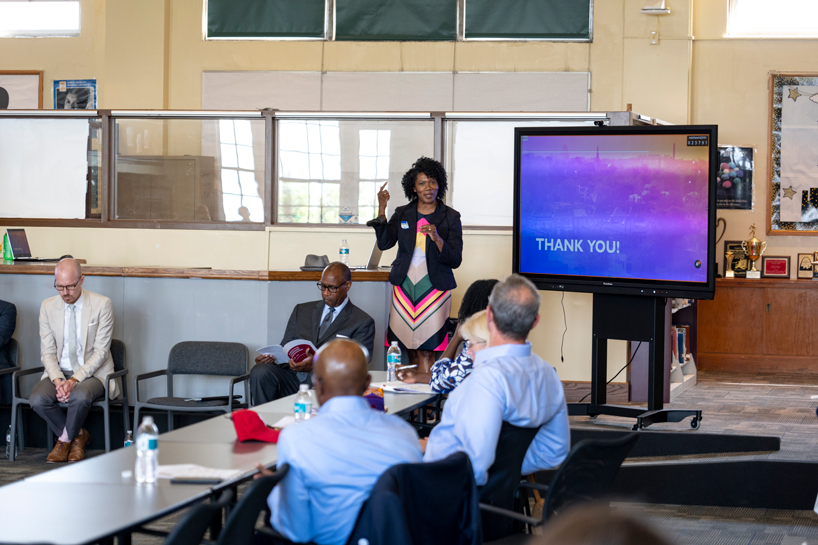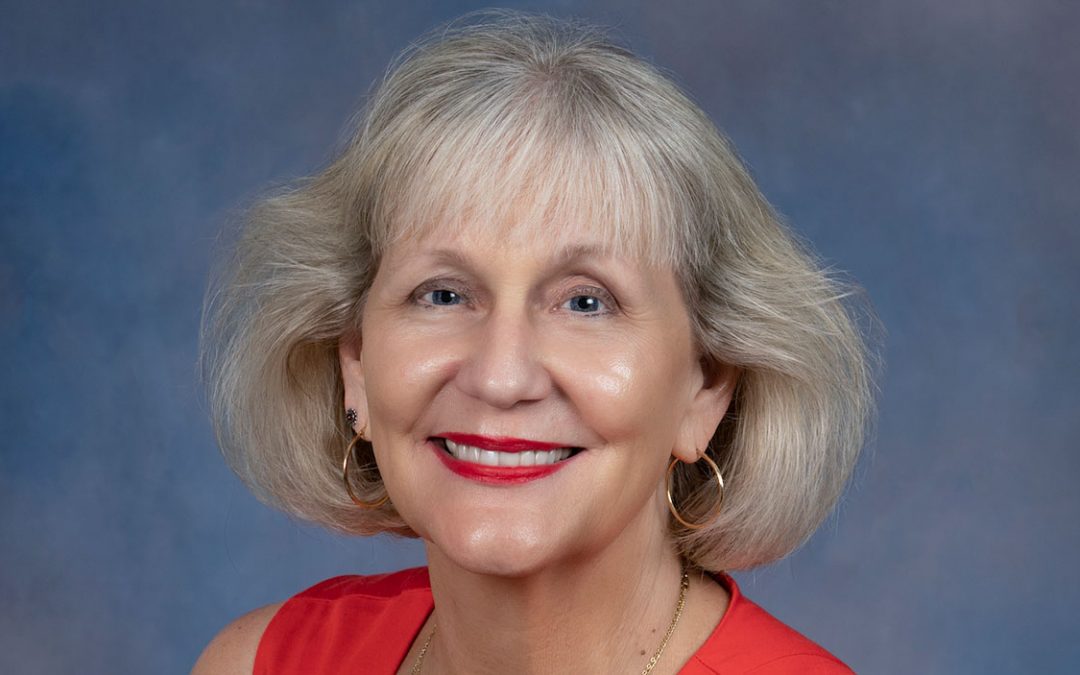
Stefani Weeden-Smith was hired in September to serve as the inaugural director of the St. Louis Anchor Action Network. The Network, led by the University of Missouri–St. Louis and Edward Jones, brings together higher education institutions, hospital systems, corporations and nonprofits with a shared commitment to advancing racial equity and removing barriers to economic opportunity. (Photos by August Jennewein)
Stefani Weeden-Smith has had to practice patience since taking over as the inaugural director of the St. Louis Anchor Action Network.
The alliance of higher education institutions, hospital systems, corporations and nonprofits, being led by the University of Missouri–St. Louis and Edward Jones, has a shared commitment to advancing racial equity and removing barriers to economic opportunity so that everyone in the region has a chance to thrive.
It’s working to use the collective power of its members to increase hiring and procurement opportunities for people and businesses in 22 ZIP codes of St. Louis city and St. Louis County that have faced decades of disinvestment.
But change rarely happens overnight, particularly when it involves moving large organizations with thousands of employees and almost as many commitments and initiatives.
“On any given day, what’s the hardest is that change is slow,” Weeden-Smith said, “because even though I’d like to move things faster, we can’t because we are still building the foundation.”
Almost 10 months into her new role, Weeden believes she has a clearer understanding of what needs to happen to make progress toward creating a more equitable region.
“I see the whole picture now,” she said. “I can see where some of the places of tension are and how we ease that tension. I also see the connections that we need to make more clearly, including what the barriers are and what the ways we will need to change. Some of the systems that we’ve created in the past no longer serve us, so we’re trying to ask, how do you break out of some of those systems and try new things?”
St. Louis Anchor Action Network Director Stefani Weeden-Smith speaks to the audience at an executive learning experience held last month at Sumner High School in the historic Ville Neighborhood.
One example would be the requirement of a four-year degree in job listings. There’s greater understanding that the duties performed in many of these positions do not actually require a four-year degree, and requiring one could prevent an organization from assembling a more diverse applicant pool.
But Weeden-Smith, who works as part of UMSL’s Office of Research and Economic and Community Development, might be even more optimistic about what is possible.
She notes that a go-it-alone attitude has prevailed for too long in the St. Louis region, and attempts at change have tended to be one-off measures with limited impact. She was recently in a meeting with representatives of the members discussing their individual approaches to business procurement.
“One of the members remarked, ‘This is kind of amazing,’” Weeden-Smith said. “He’s like, ‘In my 30 years of doing supplier diversity, I’ve never really seen these types of organizations try and come together in the way that we are. Can you imagine if we really could scale that impact? If we collectively move in the same direction? Imagine the impact we could make in this city.’
“It was really interesting to hear. We’re in a place that, yes, it’s messy, but people are seeing the potential, and it’s not just words. It really will happen when we all come together.”
Weeden-Smith, who was selected to take part in this year’s Leadership St. Louis class, is key to helping all of the members align their work.
“We are so pleased to have Stefani leading the St. Louis Anchor Action Network,” Chancellor Kristin Sobolik said. “She understands the region and its challenges and opportunities, and she’s worked collaboratively to bring people and large institutions together to understand and see the bigger picture of human and societal impact. She also is focused on details like aligning data collection and metrics. Stefani is pragmatic yet optimistic and hopeful, and she brings that attitude and those skills to her work every day.”
“Our region benefits from strong coalitions like the St. Louis Anchor Action Network,” said Penny Pennington, managing partner at Edward Jones. “In her short tenure as director, Stefani has proven her ability to lift up voices and foster strong collaboration within our network and our community to build a better future together. We are fortunate to have her in this leadership role and are confident that Stefani will continue to advance the mission of the Network to create a more equitable region where everyone in St. Louis can thrive.”
Weeden-Smith believes strongly in that goal.
A lifelong St. Louisan raised in Ferguson, she’s seen the inequities that exist throughout the region. Her own father worked as a machinist at McDonnell Douglas Corporation but eventually landed a white-collar position in sales and was able to build a middle-class life for his family. She also knows the wealth he built did not grow at the same rate as it might have in other parts of the region.
The Ferguson-Florissant School District that helped educate her and prepare her for college at Rockhurst University, where she earned BSBA in marketing, has seen its academic reputation erode over the past 20 years, partly a result of white flight and the declining tax base it left behind.
“This is very personal to me,” said Weeden-Smith, who today makes her home in the Tower Grove East neighborhood. “A lot of these communities have been forgotten or people have walked away, and I still believe there are a lot of possibilities that we’ve left behind. I am really excited about putting more energy and investment in communities and people and seeing what can come out of it.”
Weeden-Smith first learned about the director position with the St. Louis Anchor Action Network when one of the members reached out to her about it and suggested she apply.
At the time, she was serving as the assistant director of community engagement at the Gephardt Institute for Civic and Community Engagement at Washington University in St. Louis, a position she started in 2016.
Before that, Weeden-Smith – who holds a Master of Professional Studies at the Pratt Institute in Brooklyn, New York – had spent two years the program director at NCCJ St. Louis, an organization that works for the advancement of amity, peace and justice and bringing together diverse people to strengthen intergroup relations. She also served as the interim executive director at Teen Pregnancy & Prevention Partnership in 2014 and held several positions working on prevention of sexually transmitted infections, including HIV, and substance use.
“He thought this position would be really interesting since it stitches together a lot of work I’d recently done,” she said. “I have a history of working to integrate equity and inclusion into our day-to-day work and personal lives, and I had been thinking about equity on a very deep level. My work at WashU looked at how we could institute a community engagement strategy that worked with community on a level that included the university being authentic, responsive, and mutually beneficial.
Weeden-Smith’s job is in many ways akin to running a startup – not something she’s ever been part of before, though also not something completely foreign.
“In most of my positions in the past, I’ve been the first person in those positions,” she said.
It’s been a big undertaking, learning about each organization in the network and how she can help them align their hiring and procurement processes and procedures with the network’s goals while also engaging with existing community organizations working on issues of equity and building general awareness of those efforts.
She is hoping to be able to add staff in the coming year to be able to aid in that work.
“When I look at the national work, it really is about high touch,” Weeden-Smith said. “I really want to provide a lot of technical assistance. ‘How do I help you and your individual team make the changes necessary for community members to see change? ?’”
A big part of the past 10 months has been facilitating discussions between representatives of the community so they can learn from each other’s experiences.
Last month, she also organized an executive learning experience in the historic Ville neighborhood so that members could better understand the needs of the people living in the community. The event featured a walking tour of some of the historic buildings located near Sumner High School and a panel discussion with some community leaders.
To elicit buy-in, Weeden-Smith has learned to focus on the pragmatic.
“I used to think, ‘Oh, people should care about everyone that lives in St. Louis,’” she said. “That was my background in social services. But the fact is, it’s just better business. Do we really want the story of St. Louis to be that we are the highest in crime and one of the most segregated cities in the country? I know that we can be more than that. What is fueling me is that the more I see and talk with our community members and local businesses, I don’t buy it. We are more than this. We continue to leave real economic drivers on the table, and if we can figure that out, there’s a lot of potential for us.”















